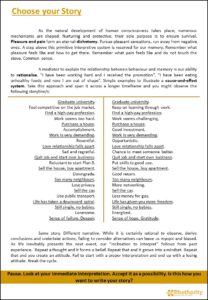Choose Your Story
As human consciousness evolves, our minds develop mechanisms designed to protect and nurture us. At their core, these mechanisms ensure survival. Pleasure and pain become guiding forces—an eternal dichotomy. We instinctively pursue pleasant sensations while avoiding negative ones.
Layered upon this primal instinct is our memory. Memory allows us to remember pleasure and its source or recall pain and avoid its cause. It’s a fundamental principle: experience teaches us not to touch the stove.
Beyond memory lies another critical tool: rationalization. This ability helps us connect behavior to outcomes, creating a cause-and-effect narrative. For instance:
- “I worked hard, so I received a promotion.”
- “I ate unhealthy foods, and now I’m out of shape.”
These rational conclusions help us navigate life, but they also influence the broader narratives we build. How we interpret life events shapes our mindset and, ultimately, the story we tell ourselves. Let’s explore this concept using two distinct interpretations of the same events.
Two Storylines, Two Realities
Storyline 1: A Downward Spiral
- Graduate university. Feel competitive on the job market.
- Find a high-paying job. Work seems too hard.
- Purchase a house. Accomplishment.
- Work becomes very demanding. Resentful.
- Love relationship ends. Sad and regretful.
- Quit job and start a business. Reluctant to pursue Plan B.
- Sell the house, buy an apartment. Feels like a downgrade.
- Too many neighbors. Lose privacy.
- Sell the car. Rely on public transport.
- Life spirals downward.
- Still single, no children. Lonesome.
- Sense of failure. Despair.
Storyline 2: A Path to Growth
- Graduate university. Continue learning through work.
- Find a high-paying job. Work feels challenging.
- Purchase a house. Celebrate a good investment.
- Work becomes very demanding. View it as an opportunity.
- Love relationship ends. Chance to meet someone better.
- Quit job and start a business. Use skills and experience.
- Sell the house, buy an apartment. Earn a good return.
- Too many neighbors. Gain opportunities for networking.
- Sell the car. Save money and enjoy simplicity.
- Life offers more freedom.
- Still single, no children. Feel energized.
- Sense of hope. Gratitude.
The Power of Perspective
Same events. Different narratives. How can two identical situations evoke such contrasting emotional outcomes? The answer lies in interpretation.
When faced with life’s challenges, our natural inclination is to interpret events based on past experiences. This process can be helpful, but it also introduces the risk of bias. Repeated interpretations form beliefs, which grow into mindsets and eventually shape attitudes. If the initial interpretation is negative, the resulting mindset may limit opportunities and deepen dissatisfaction.
How to Break the Cycle
To take control of your story, you must first pause and evaluate your initial interpretation. Consider it as one possibility among many rather than the definitive truth. This practice fosters flexibility and opens the door to alternative perspectives.
Here’s how to start rewriting your story:
- Pause and Reflect: Before reacting, take a moment to observe your immediate thoughts.
- Challenge Assumptions: Ask yourself, Is this interpretation helpful or limiting?
- Reframe the Narrative: Instead of dwelling on setbacks, focus on opportunities and lessons.
For example, losing a job can feel like failure, but it can also be reframed as a chance to pursue a passion or gain new skills. Similarly, a breakup might lead to feelings of loss but can also create space for personal growth and new connections.
Choose Your Story
Life will continue to unfold, presenting events beyond your control. However, your power lies in how you interpret and respond to those events. By choosing a narrative that fosters hope, gratitude, and growth, you can transform challenges into stepping stones.
So, next time you encounter a difficult situation, ask yourself: Is this the story I want to tell?

